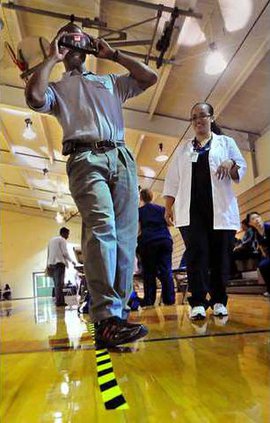Dwight Mallory is trying to get back on his feet, after spending the past four-plus years living on Atlanta's streets.
He found some answers and direction at this weekend's Stand Down for Veterans, a two-day event in South Hall geared to hooking up veterans, homeless and otherwise, with needed services.
"Look at these tables. If you're homeless and you're trying to get help from the (U.S. Department of Veterans Affairs), it's usually going to be en masse. Here it's (one on one)," he said, scanning the gym of the old South Hall Middle School off Atlanta Highway.
"These folks here kind of gave me a little bit of esteem and rejuvenation. More than anything, they gave me knowledge," said Mallory, a U.S. Coast Guard veteran serving 1979-83.
The event, which ended Sunday, was the result of a grass-roots effort led by Johnny Varner, American Legion Post 328 commander, and Suwanee-based Universal Benevolence Center led by Carol Hriczov.
The aim was to help veterans with a variety of services, such as health screenings, counseling and referrals to different agencies, and supply basic needs, including food, clothing and haircuts.
Volunteers had prepared to even house veterans overnight in tents behind the gym.
"As an inaugural event, having never been done in Hall County much less Northeast Georgia, it was a success," Varner said Sunday. "We could have served more veterans, but we're back again to the learning curve of the community to understand what the Stand Down really means."
Similar service projects have taken place throughout the country through the National Coalition for Homeless Veterans.
The original Stand Down was modeled after the concept used during the Vietnam War to provide a safe retreat for units returning from combat operations, according to the coalition's website.
Last week, Varner said in an interview that he had trouble conveying to the public what volunteers were trying to do.
"It's been one of the toughest projects I've taken on, and with a zero budget," he said.
About 20 veterans took advantage of the services, compared to about 150-plus volunteers.
Varner said he believes that event understanding will be a focus next year as work gets under way for the second Stand Down.
"We'll probably do more things in a three-month interval leading up to the next one: maybe a resource fair, maybe a job fair," he said. "And that way, maybe the terminology resonates over a period of time.
"And then maybe the public will know this is more than just serving homeless veterans."
As for Mallory, he will have encouragement and help from the Rev. Victor Lamar Johnson, an American Legion service officer.
"I'll be shadowing him until he leaves or makes up his mind about what he wants to do," he said. "The next thing is to make sure he has living arrangements, he has proper shoes on his feet, proper clothing."
Johnson, a Vietnam War veteran, said veterans need to watch out for each other.
"We're going to have other veterans coming home and they're going to need more help than these vets," he said.

